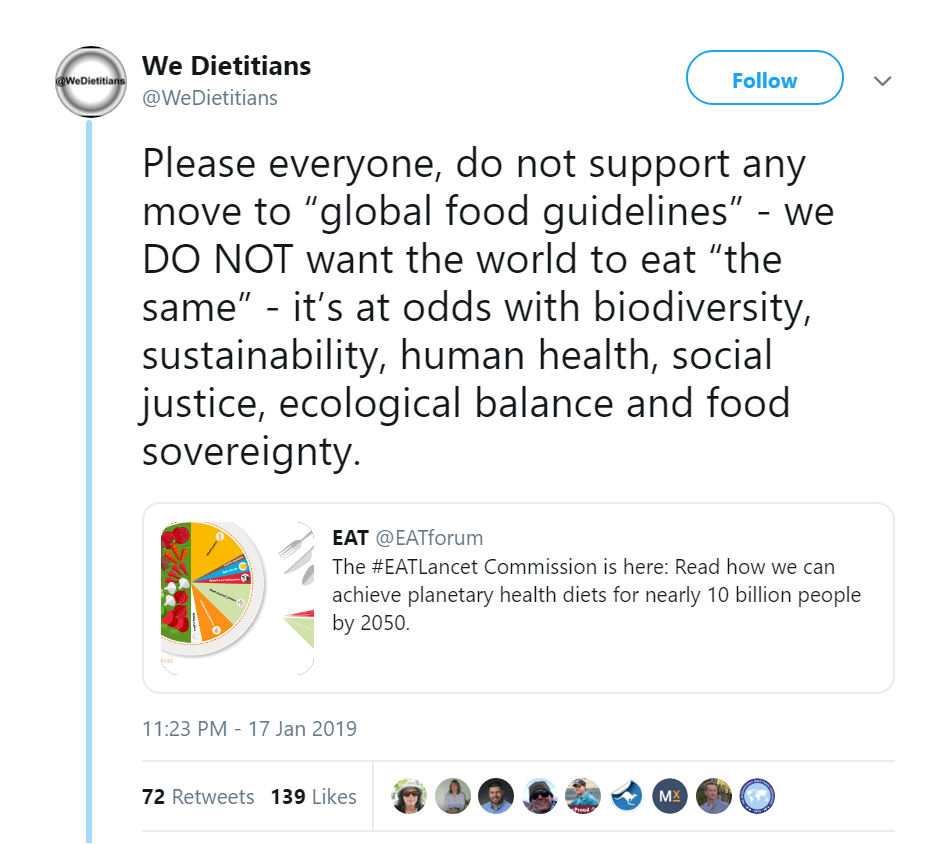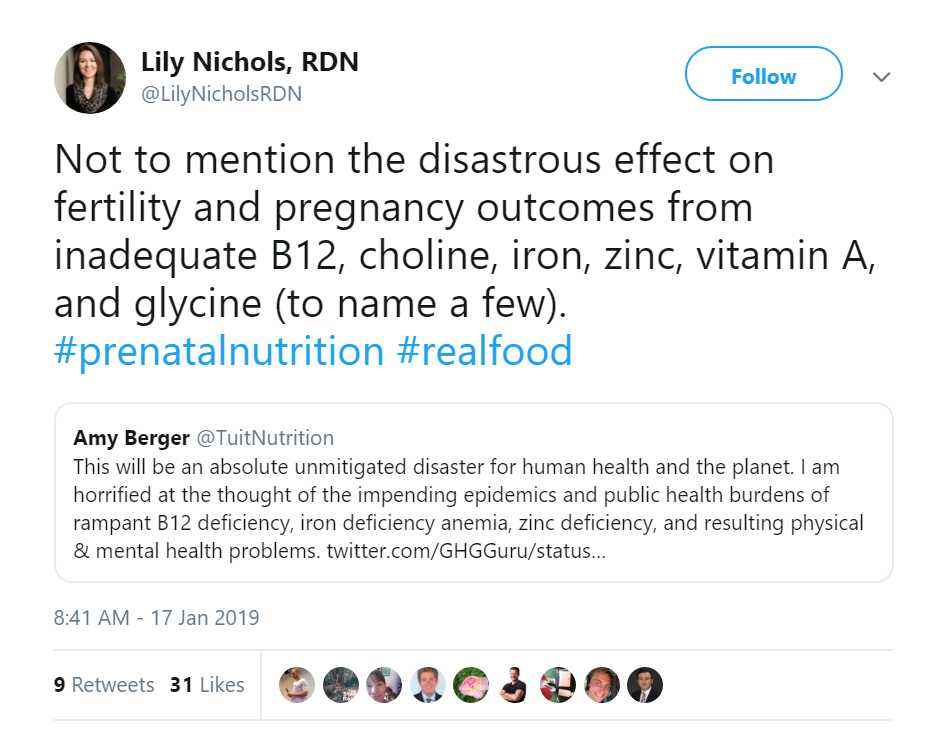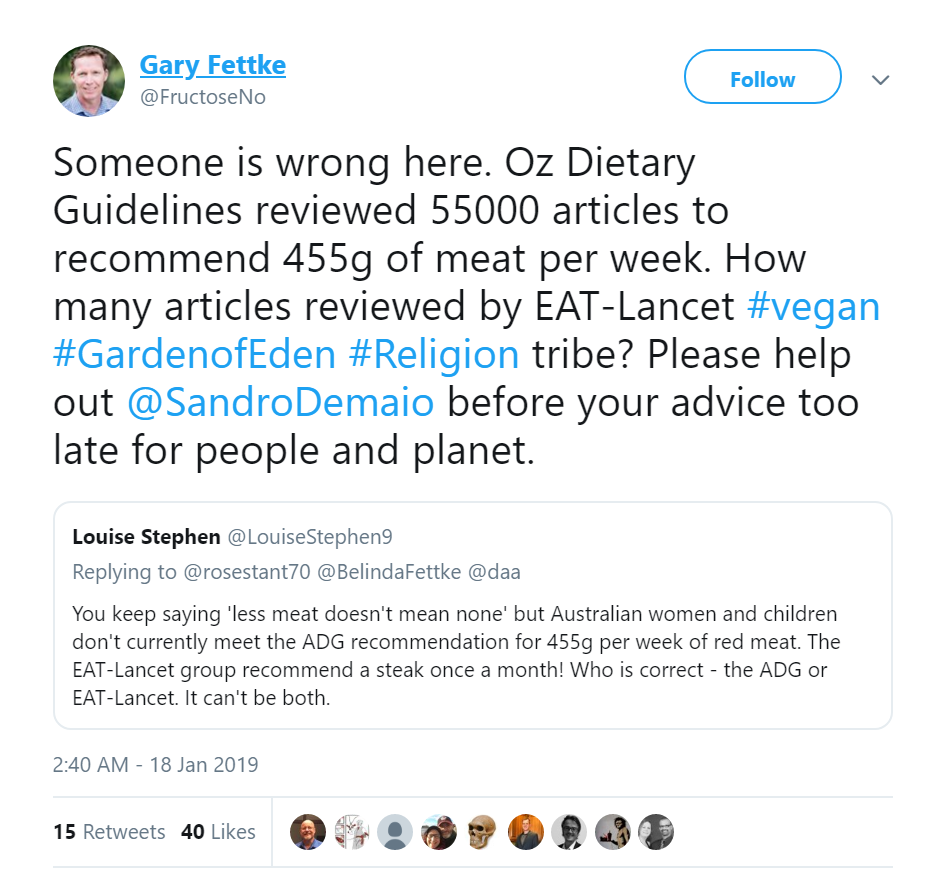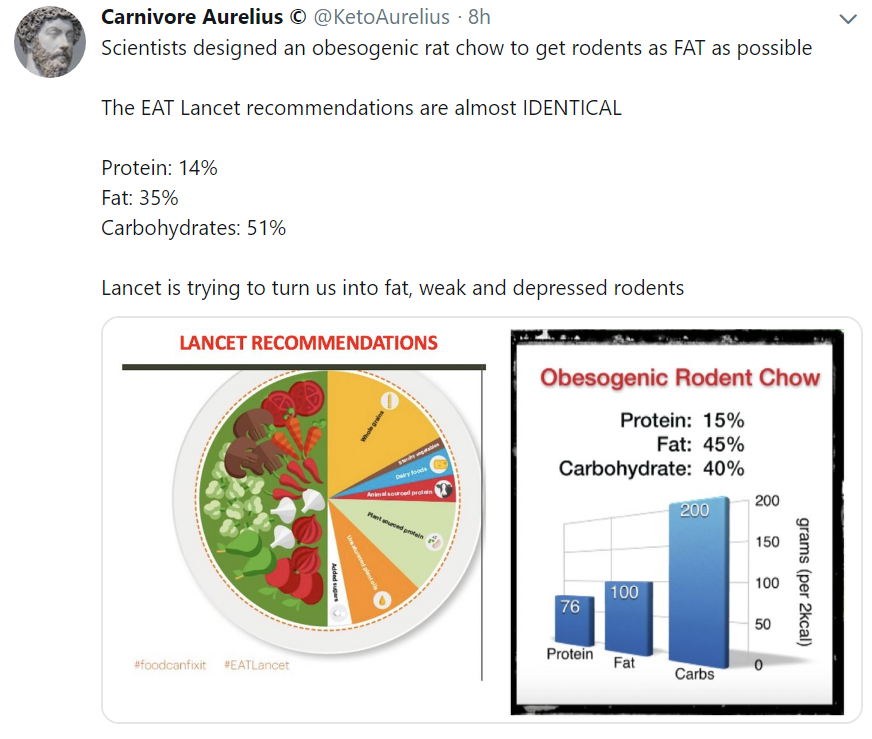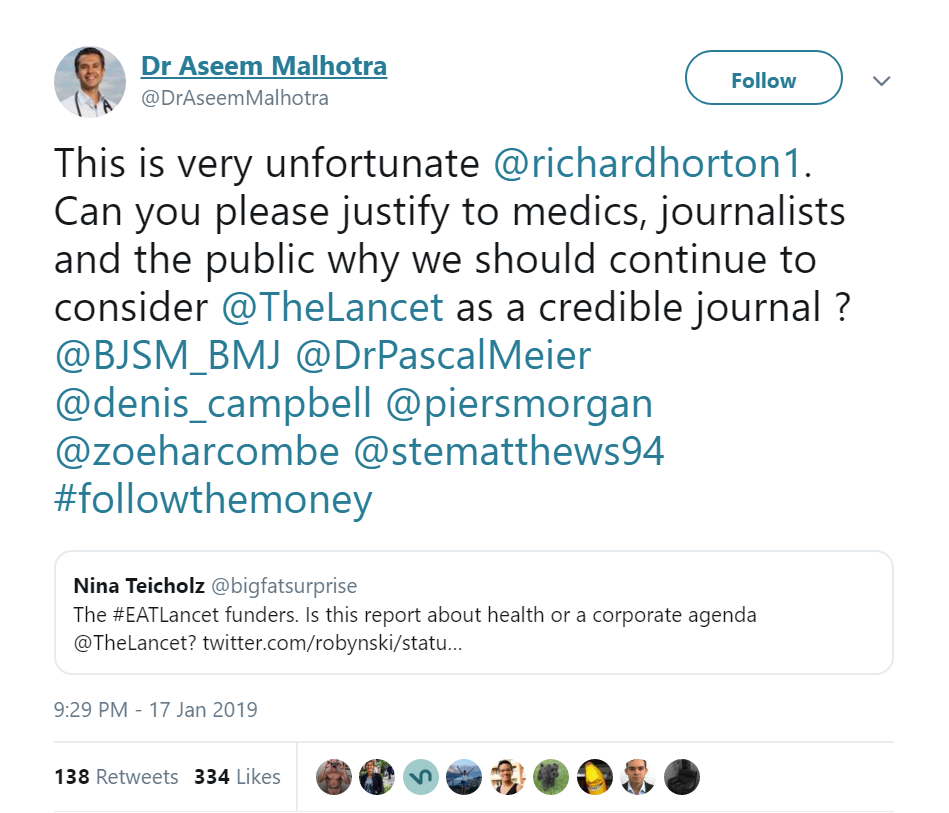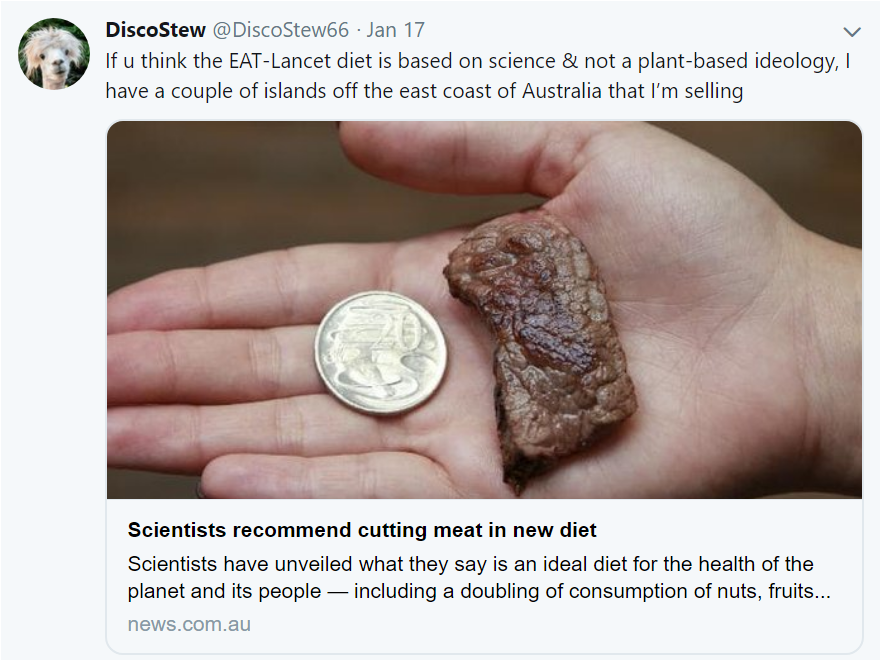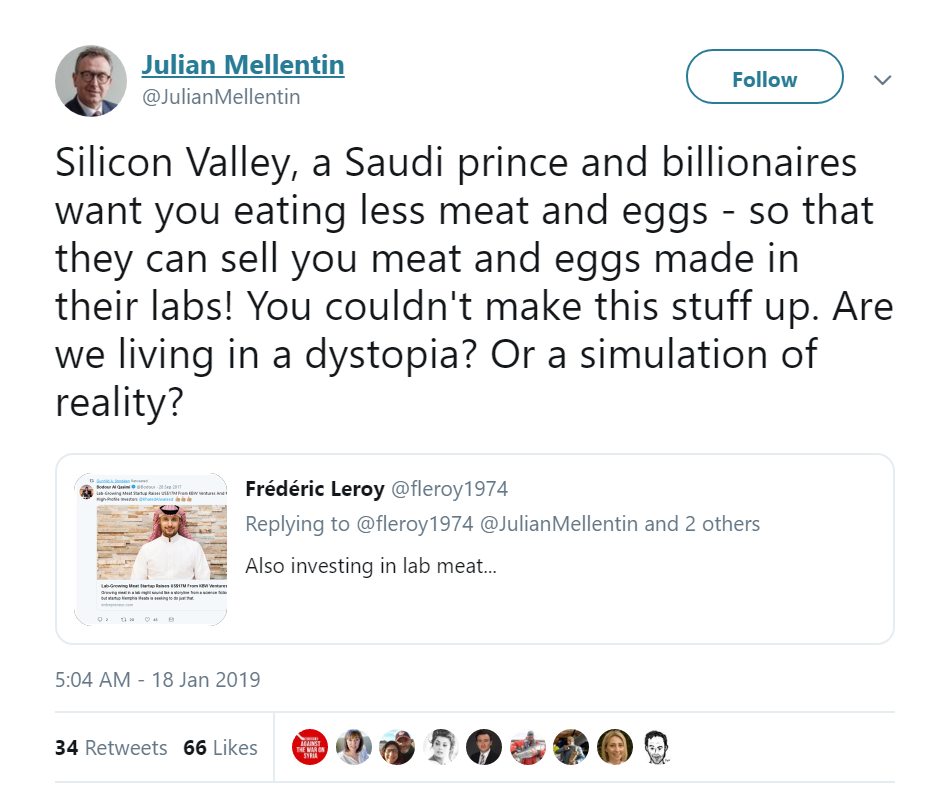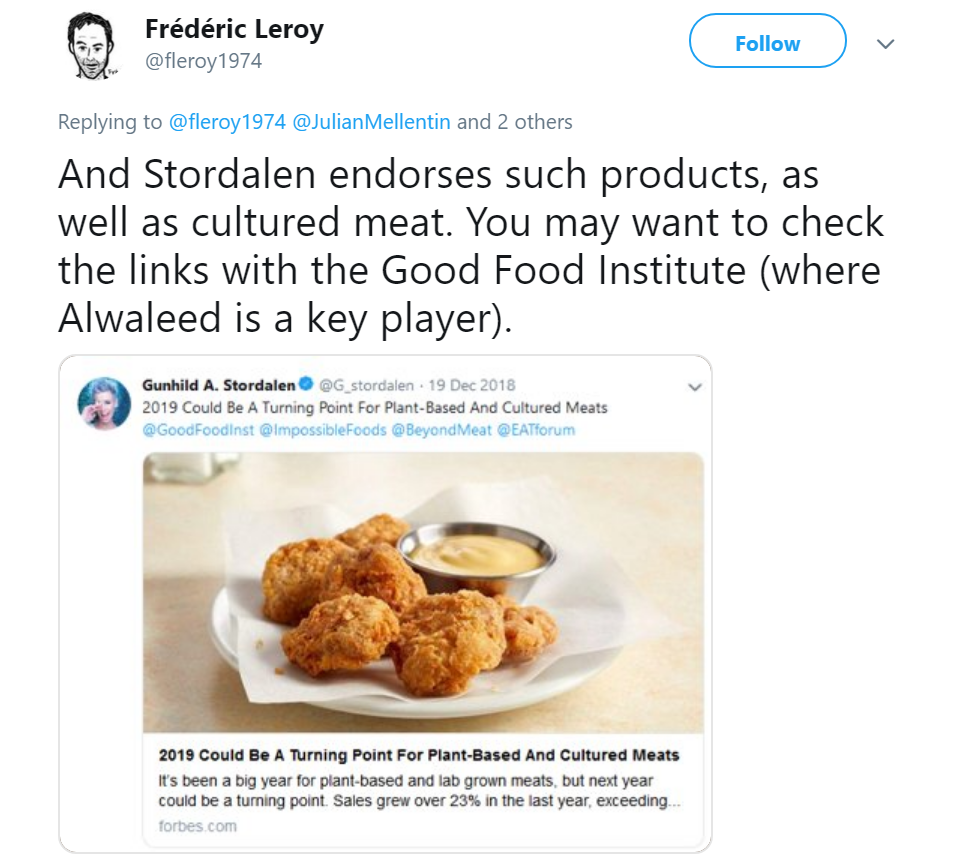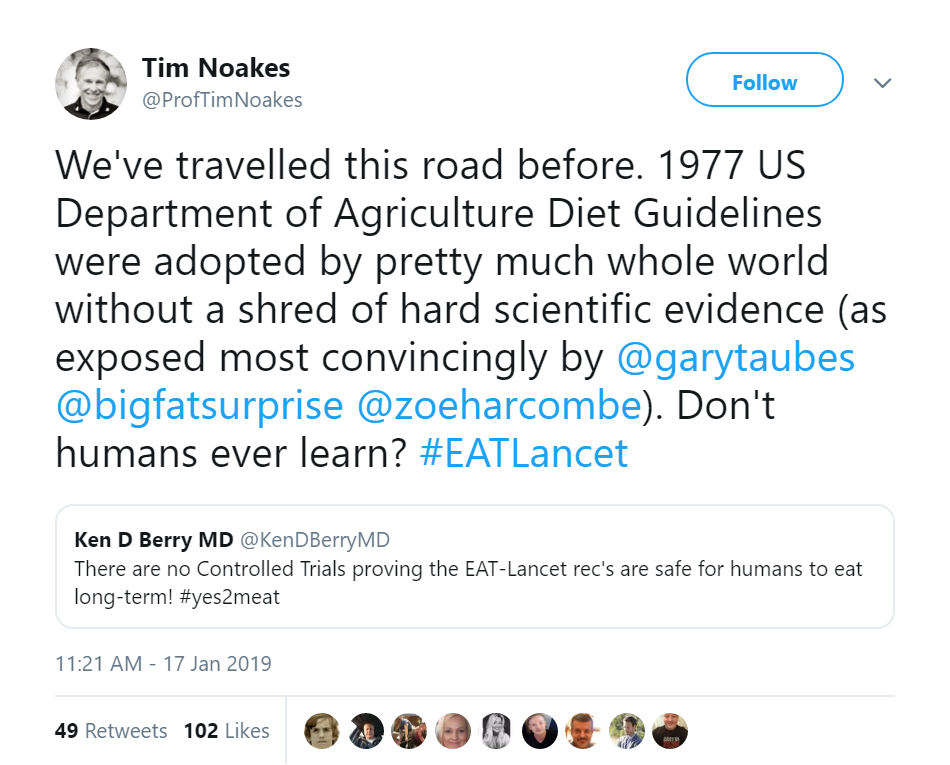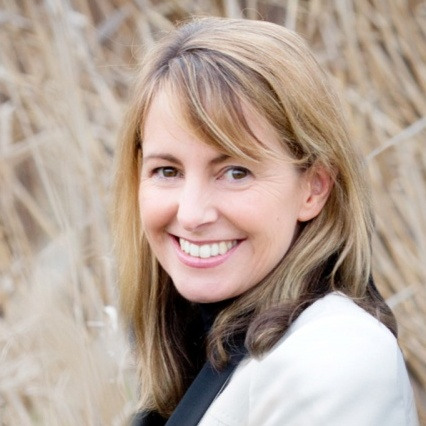Firstly, as I have stated before, I am not anti-vegan nor anti-religion. I am pro-choice, especially when it comes to health!
I want to use this space to share a summary of views that question not only the validity, but the motives, of the EAT-Lancet Commission's push to reduce meat consumption, published January 17th, 2019. Things are getting pretty heated on social media platforms, especially Twitter.

If you have been following me you know where the beans over beef messaging comes from! If not, Loma Linda University is owned by the Seventh-day Adventist Church and they promote the Garden of Eden diet (fruit, grains, nuts and vegetables) as prophesied by Ellen G White in 1863 after she was told in a vision from God that meat made men violent and led to 'self-vice'. Masturbation was considered the most heinous sin at the time and had to be avoided at all costs 'for salvation'. Luckily, Kellogg's invented Cornflakes at the Adventist owned Battle Creek Sanitarium, enabling the San to offer a bland alternative to meat at breakfast! Hence, the anti-meat, pro-cereal/grain and soy messaging continues to be evangelised from Adventist health institutions world-wide. Even for Type 2 diabetes as shown here.
But, the Adventist claim of meat causing diabetes makes no sense when you look at the figures Nina Teicholz shared in her tweet today, comparing animal protein and plant food consumption from 1970-2014 with increasing diabetes rates! In fact, the reverse is shown with no correlation to meat, whatsoever.
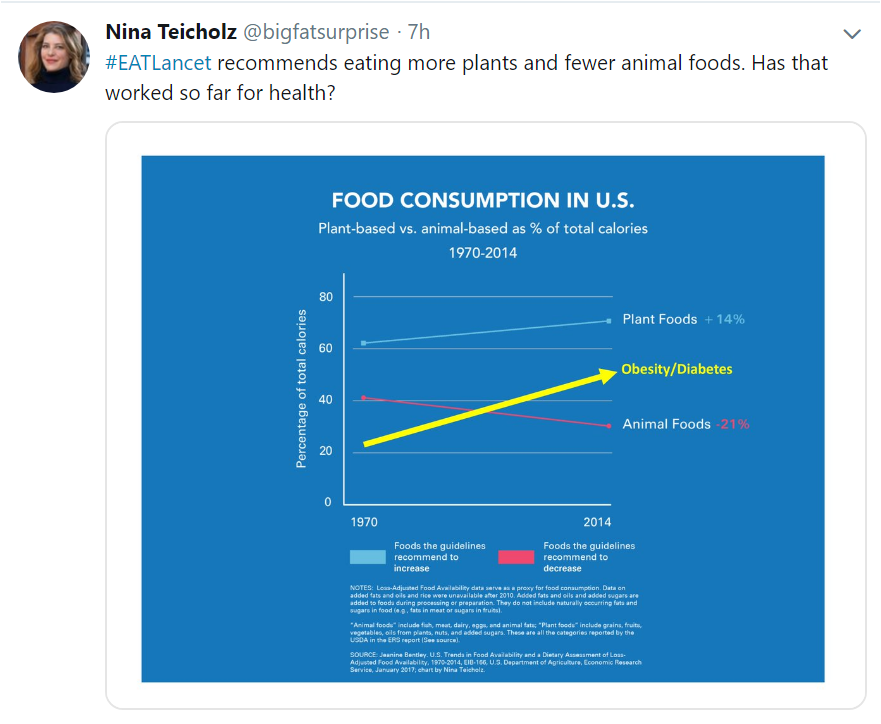
As you may be aware, I have made many references to the Vested Interests and Ideology shaping Nutrition Guidelines in previous posts but this one is probably the one that has the potential to change our health forever ... and not in a good way, despite what the Norwegian Founder of EAT - Gunhild Stordalen, the Australian CEO of the EAT Foundation - Sandro Demaio, Harvard Professor - Walter Willett and the world-wide headlines they created, are claiming.
Interestingly, Frédéric Leroy and Martin Cohen published a powerful opinion piece about the EAT-Lancet Commission's upcoming campaign, questioning their global action against meat prior to the official announcement on Wednesday, saying: "isn’t it remarkable how meat, symbolizing health and vitality since millennia, is now often depicted as detrimental to our bodies, the animals, and the planet?"
Considerations on the EAT-Lancet Commission Report by Carni Sostenibili
"Today, Thursday 17th January, the EAT-Lancet Commission, together with a group of 37 highly influential researchers, returns to the fray with a new report on “sustainable food systems”. Which, whilst supporting the need for a global shift towards a “plant-based” diet and stigmatising livestock breeding as harmful, assembles a series of food invitations that are radical and non-scientifically valid.
"One above the rest: the almost total abandonment of animal protein consumption.
"All in the name of the interests of a few producers of plant-based food substitutes for meat and dairy products, the EAT-Lancet document aims at media hype rather than the validity of its contents. But science is the arena of debate, not confrontation. The report and the methods of its disclosure demonstrate the exact opposite. The ambition of the authors to “change the world’s diet” is impracticable and dangerous, also because it risks laying the groundwork for further worldwide increases in malnutrition and food waste. It is therefore necessary to make some important considerations."
Science is not based on opinions: 37 scientists, although authoritative, are not the scientific community
"Before the publication of this report, in fact, The Lancet should have submitted it for the examination of the international scientific community, including those livestock experts, nutritionists and climatologists (each of these categories boasts thousands of valid professionals and hundreds of magazines with an impact factor).
"A critical review ex ante of a prestigious magazine is the correct way to act. Already the methods of dissemination of the report, sent in the last few days to the editors of newspapers and magazines around the world “under strict embargo”, has given the measure of the media clamour that the EAT-Lancet commission wants to achieve, rather than warn about presumed dangers resulting from the improper use of food and natural resources."
The full article is linked here.

Headlines from Martin Bagot (Mirror UK) noted that "Globe-trotting billionaire behind campaign to save planet accused of blatant hypocrisy."
He continues ... "Gunhild Stordalen, a Norwegian who owns a £20 million private jet with her husband, regularly flies to exotic destinations around the world.
"Air travel pollution is a major contributor to global warming.
"Critics claim the pair are doing exactly what she is fighting against.
Christopher Snowdon - the head of lifestyle economics at the Institute of Economic Affairs - said: “The hypocrisy of this is breathtaking."
More concerning ... not only are 'the Elite', and the Corporate's partnering with them, telling the world's population to consume a 'one-size fits all' vegan diet, they are suggesting everyone should adopt their 'Planetary Health Diet' for moral reasons, regardless of health, while flaunting the fact 'the Rules' don't apply to them!
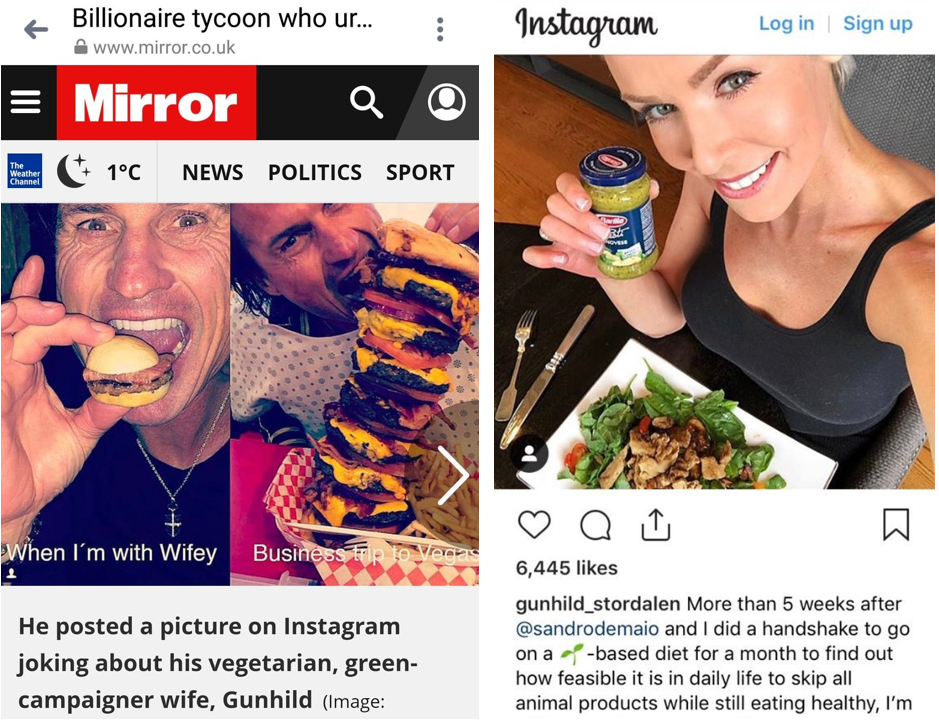
The Mirror Newspaper shared an article today showing Petter Stordalen, billionaire husband of Gunhild Stordalen - EAT Foundation's founder and Director, comparing the amount of meat he eats when he is with her and when he is without her!
It appears that Gunhild Stordalen isn't a vegan, either. An Instagram post shared on social media shows Gunhild telling everyone she 'shook hands' with EAT CEO Dr Sandro Demaio recently, and both agreed to 'try' a Plant-based diet for a month to see how it went!?!
1 month to decide the fate of the world in an N=2 study ... I hope not ![]()
After reading the evidence presented here it will be interesting to know what you think.
What is EAT?
EAT claims to be "a non-profit startup dedicated to transforming our global food system through sound science, impatient disruption and novel partnerships." Novel partnerships indeed!
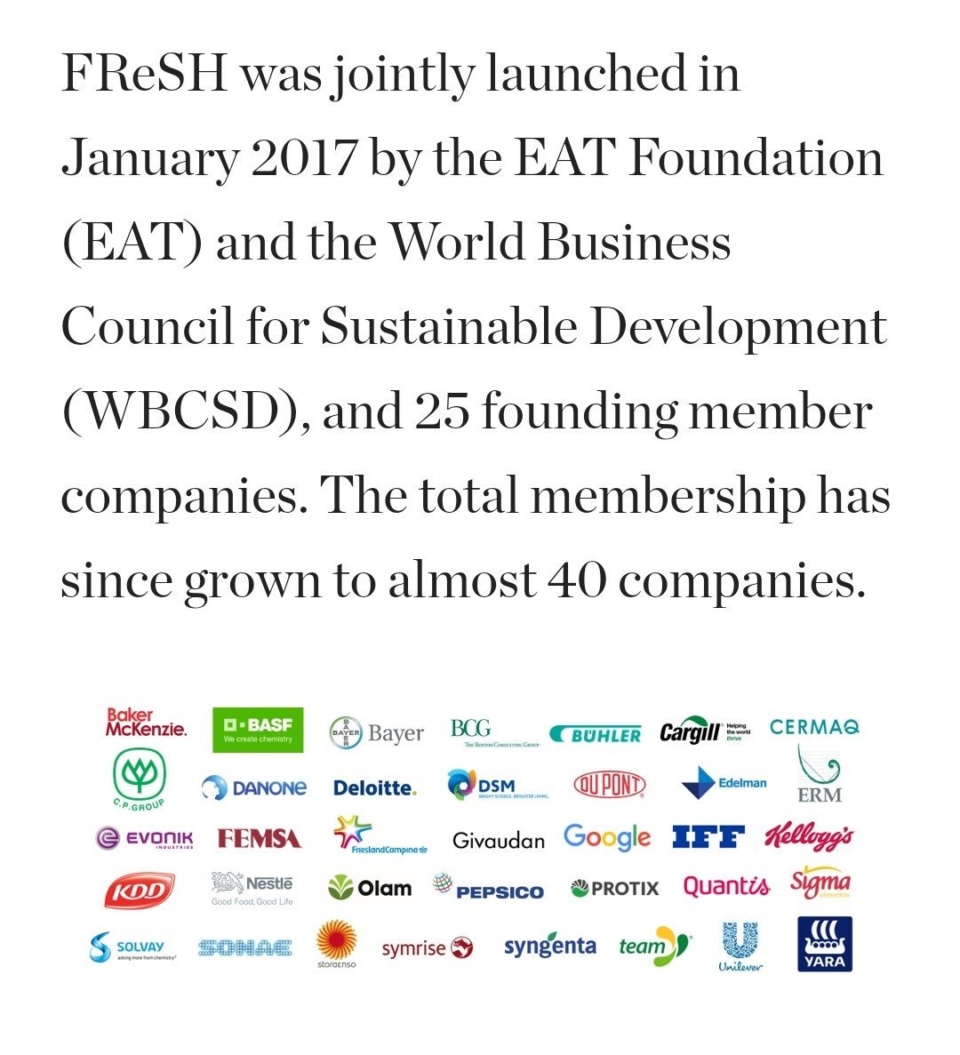
Gunhild Stordalen funded the EAT initiative under the Stordalen Foundation umbrella of which she is a Director, in 2013. The EAT Foundation, together with the Stockholm Resilience Centre and the Wellcome Trust 'work to convene experts and decision makers who together can transform the way we eat.' Nina Teicholz has something to say about that on Twitter today!
Nina's research into the potential Conflicts of Interest that Co-Chair of the EAT Lancet Commission, Walter Willett may have, is astounding. The full document is available here and the Nutrition Coalition's article on the EAT-Lancet Report is published here.
Walter Willett is the principal nutritionist on the EAT-Lancet report. The other nutritionists on the paper have published almost nothing on the subject of diet and disease, and nothing that contradicts Willett’s views. Thus, on the subject of diet and health, the report presents only one viewpoint. This report cannot be considered a balanced paper.
Dr Angela Stanton goes a step further and claims the EAT-Lancet Report to be 'the biggest lie' after completing a nutrition course at Harvard University last year. As she says, "Get ready for a bumpy ride!"
What is FReSH?
FReSH was jointly launched in 2017 by the EAT Foundation and the World Business Council for Sustainable Development (WBCSD) and 25 founding companies, including major players in the food and pharmaceutical industries.
No wonder the EAT-Lancet Commission have an anti-meat/dairy agenda and promote whole-grains and polyunsaturated oils!
What does the Eat-Lancet Healthy Reference Diet look like?
With animal protein reduced to 0-14 grams (average 7 grams) and no requirement for dairy acknowledged, while at the same time recommending 232 grams of whole-grains and allowing up to 31 grams of added sugars, I would say pretty poor, all things considered!
Imagine a glucose load from carbohydrates of 58 teaspoons for people with Type 2 diabetes! It is beyond comprehension ...
The Science - Nutrient Deficiencies
Zoe Harcombe, PhD, has run the numbers and found the EAT-Lancet's so-called 'healthy reference diet' to be nutritionally deficient in the following nutrients: Vitamin B12, Retinol, Vitamin D, Vitamin K, Sodium, Potassium, Calcium, Iron and Omega-3 essential fatty acids. How can this possibly become Global Policy?
Zoe replicated the 'healthy reference diet' "using a front-end tool, which I have had developed to run off the USDA (United States Department of Agriculture) all-food database, I entered the foods as closely to Table 1 in the Lancet as possible.
"The EAT diet is based on an adult male. An adult female would likely consume four fifths of the above diet and thus four fifths of the above vitamins and minerals. Notwithstanding this, the above diet is deficient (Zoe's article gives full values and references, and is well worth reading.)
She concludes "there are numerous other issues with this plant-biased advice. Not least – what will all these plants be grown in when there is no top soil left because we have replaced soil-rejuvenating ruminants with soil-raping plants?"
The Sustainable Food Trust believe that the EAT-Lancet report’s recommendations are at odds with sustainable food production as outlined here.
Putting aside the actual recommendations let's take a look at what this means...
What does an Optimised Nutrient Diet look like?
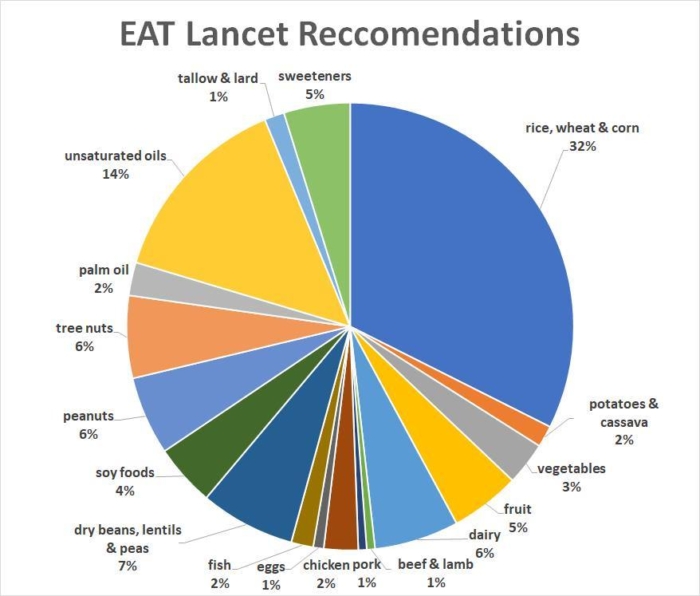
Australian engineer Marty Kendall has been studying the nutrient density of foods for several years now and put together an incredible resource over at Optimising Nutrition where he created a framework around eating for health. This framework focuses on three primary parameters: energy density; nutrient density; and insulin load.
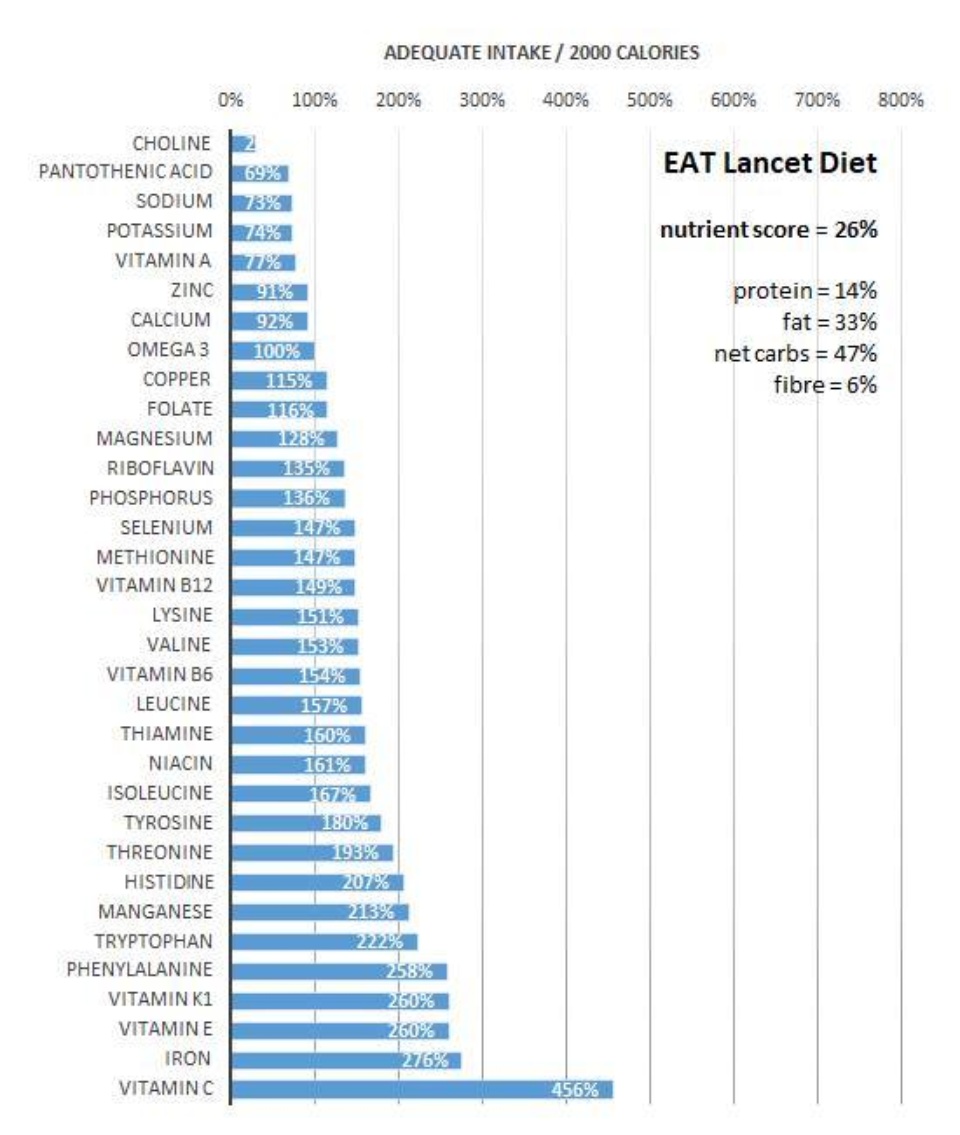
Using his app, Marty has plotted the EAT-Lancet Planetary Health Diet onto a pie chart and then extrapolated the data into a graph. The detailed graph highlights the lack of nutrients. In fact, the EAT-Lancet Planetary Health Diet is barely optimised for health scoring a mere 26% of daily requirements. Marty's detailed post is linked here.
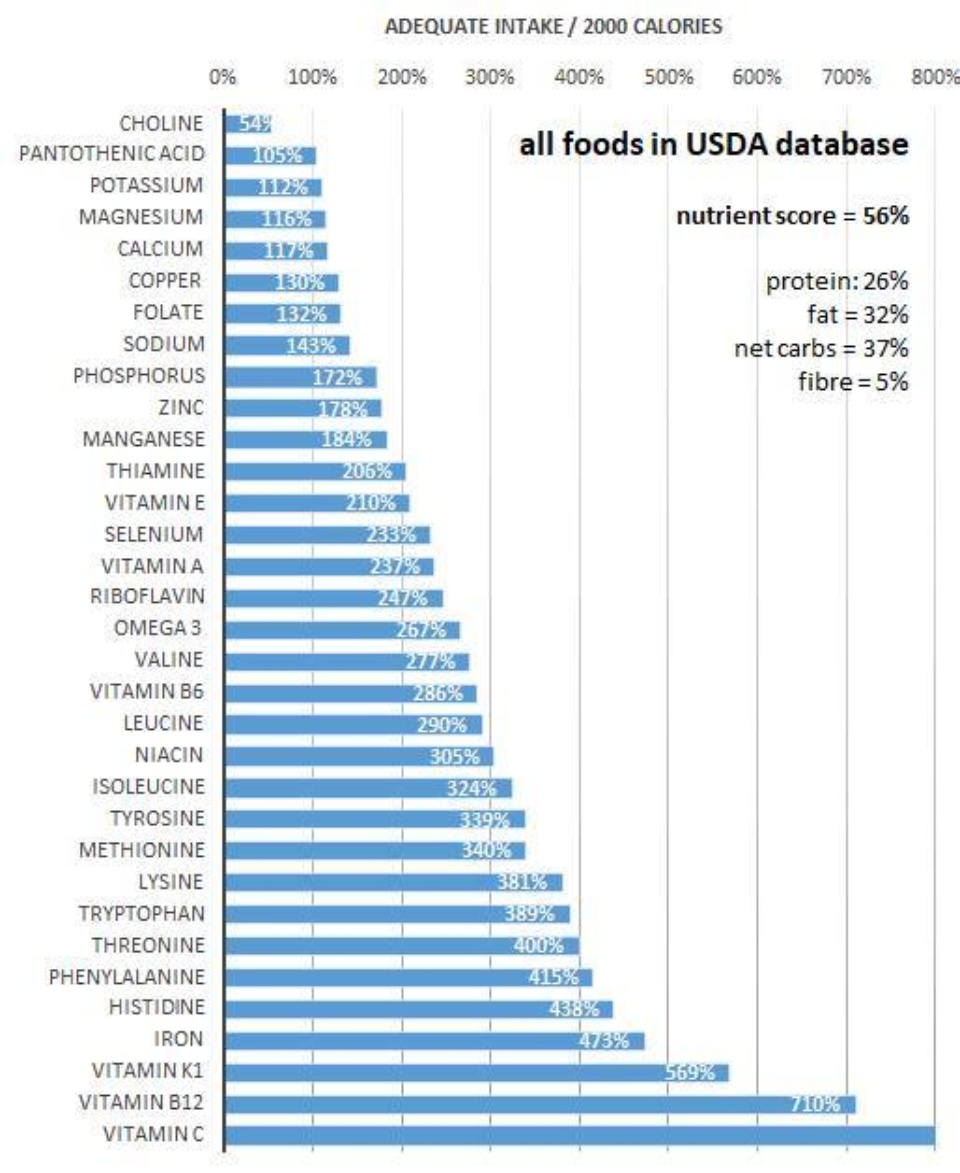
It seems your nutrient profile would be much better if you just ate the average of all the foods in the USDA database, which is a scary thought!

Whereas, nutrient dense foods will be vastly better for your health and wellbeing, and no doubt taste better, too! When you eat nutrient dense foods you don't need to keep snacking which means you eat less processed food and in doing so reduce packaging and food waste.
The 10-Point Plan _ which is actually 11, but who's counting?
Disconcertingly, EAT has set "an ambitious 10-point plan for the 2017-2020 period" to help bring about 'the great food transformation' they believe is needed. These are their 'Action' points:
ACTION:
Translating Knowledge into Action
- EAT will work to reform global, national and local governance around food systems.
- EAT will influence and align political and business action.
- EAT will translate knowledge into action working through strategic partnerships.
- EAT will scan the horizon for new partners to drive reform in critical sectors and regions.
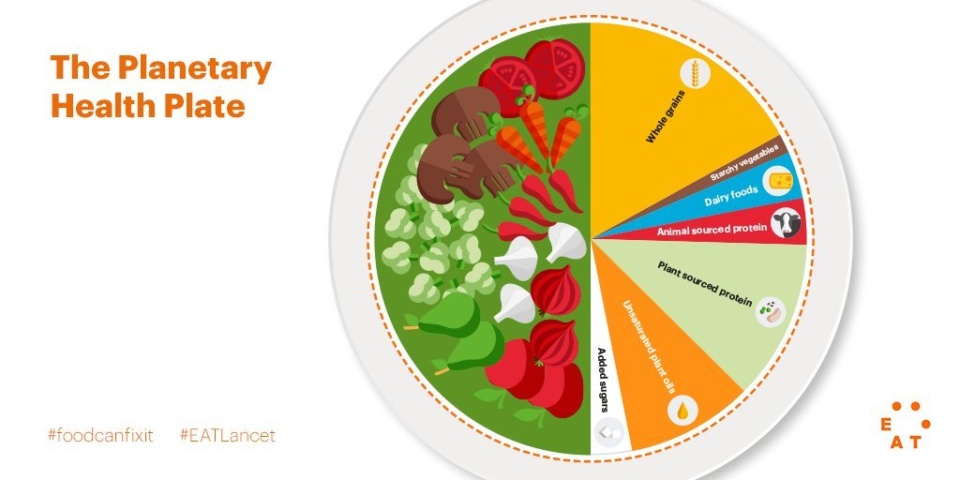
You could be forgiven for thinking the EAT-Lancet's 'Planetary Health Plate' is vegetable centric judging from the image above and the other promotional material used to market the Commission's report but, you may be surprised to learn as was I, that their proposed guidelines recommend a mere 3.1% of our dietary intake as vegetables. Can you believe this figure is a reduction from our current guidelines? 'They' seriously want us to eat less meat and vegetables and fill up on carbohydrates and polyunsaturated oils? WOW! Thanks for pointing this startling fact out to me Marty Kendall.
Dr Georgia Ede 's dissection of the report finds flaws, too!
Dr Georgia Ede read the full EAT-Lancet Commission's report thoroughly, only to discover for herself, that the authors of the non-peer reviewed paper often contradicted themselves, reluctantly acknowledging the health benefits of animal proteins and fats... but maybe 'forgot' to translate their findings into the dietary recommendations?
Georgia also discovered, like Zoe Harcombe and Marty Kendall, that the dietary recommendations are nutritionally deficient; especially for children, adolescent girls, pregnant women, the elderly, the poor and those who are metabolically compromised ... which is pretty much most of the population ![]() :-( Her article is linked here.
:-( Her article is linked here.
EAT for Health Professionals?
I first came across Dr Alessandro Demaio, a Medical Officer with the World Health Organization, Co-Founder of NCDFREE and festival21 on LinkedIn. I was inspired by his vision for NCDFREE - as a global social movement for a world without non-communicable diseases and in particular, diabetes. At the time he was advocating fresh, seasonal and local foods which sat very comfortably with me, and the work Gary and I were doing with the team at Nutrition for Life, in Tasmania.
I must admit I was surprised when I saw that he became CEO of the EAT Foundation, as I was already aware of Gunhild Stordalen's vegan agenda. I wondered how the role would fit with the concept of NCDFREE - knowing the Plant-based vegan diet included whole-grains, cereals and legumes, essentially carbohydrates which raise blood glucose levels, regardless of the Glycaemic Index Level, and help perpetuate the myth that Type 2 diabetes is a chronic progressive disease when it doesn't have to be.
Now I am just concerned...
The 'Planetary Health Plate', where added sugars take up a bigger percentage than red meat is mind-blowing! It also makes a mockery of the Dietitians Association of Australia who claimed to have reviewed 55,000 scientific papers, coming to the conclusion that we need not 7 grams of red meat, but 130-195 grams per day for optimal health. Why is there such a discrepancy between the two recommendations when the DAA Working Party, chaired by Dr Amanda Lee, reviewed so much literature?
I am concerned the brand-new Planetary Health Plate is to be introduced into the medical curriculum. Will it be supporting or competing with the Lifestyle Medicine/Exercise is Medicine LMED Collaborative currently being created by the Seventh-day Adventist Church and Coca-Cola? I wonder if that's why Pepsi is partnering with EAT?
I also find it interesting that Walter Willett is involved in both initiatives; as an Advisory Board member for the American College of Lifestyle Medicine and Co-Chair of the EAT-Lancet Commission. Is he hedging his bets or making absolutely certain the 'Plant-based' vegan diet comes to fruition? (pardon the pun!)
Here is an excerpt from the EAT-Lancet Commission Brief for Healthcare Professionals to support education and training by:
*Actively partaking in education campaigns in schools and other public services to promote the planetary health diet.
*Including nutrition and food systems in the medical curricula as main determinants of health along with several training packages to equip health professionals with the knowledge and skills to carry out diet assessments and to provide guidance and counsel on the planetary health diet
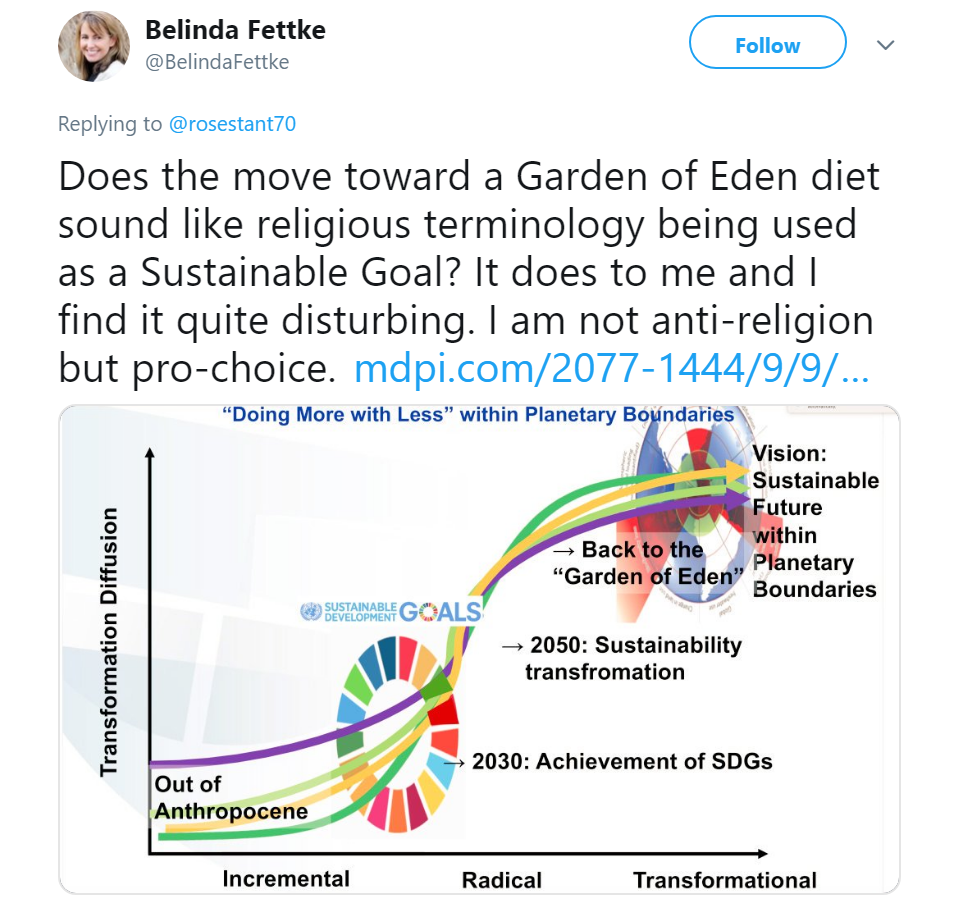
Tax, ban, regulate: the radical ‘planetary health diet’
Christopher Snowdon, Head of Lifestyle Economics at the Institute of Economic Affairs has written for Spectator Health following the release of the Lancet report food guidelines.
He says "the EAT-Lancet Commission makes no secret of its intention to force a near-vegan diet on the world’s population through the use of taxes, bans and regulation."
"They state their preferred option bluntly: ‘restrict choice’ or, better still, ‘eliminate choice’. In wealthy countries such as Britain, ‘a priority is to offer less than what is currently offered by reducing portions, choice, and packaging’. They even propose ‘rationing on a population scale’."
The Sun reporter Nick McDermott noted; "under the controversial proposals, adults will be expected to fill their diets with whole grains, soy, veg and nuts.
"The EAT-Lancet Commission spent three years calculating the first scientific targets for a healthy, globally-sustainable diet.
"But the panel of experts admitted none of them were on it." ... um? So, the expert panel are allowed to eat meat but we aren't? Are you seriously telling me that the expert panel don't have to fill themselves up on fake soy meats and legumes? Well, that doesn't sound very fair!
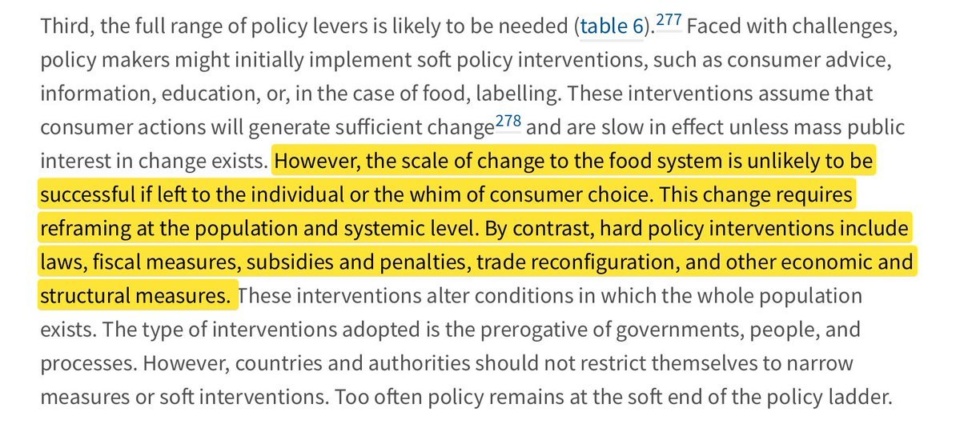
It appears that part of the EAT-Lancet agenda is to promote Governments to use coercive tactics in an attempt to force people to eat an increasingly Plant-Based diet. How can eating fortified, highly processed foods be considered healthy?
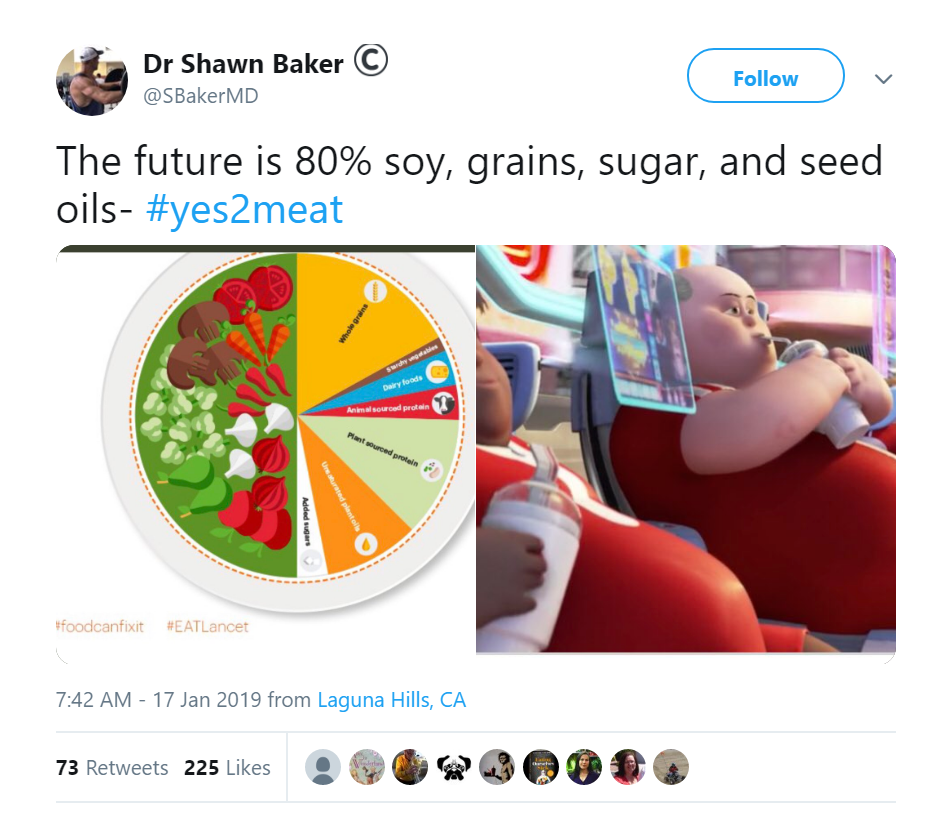
Why we should resist the 'vegan putsch'...
Joanna Blythman acknowledges in her article that "this well-financed transnational organisation of strategically placed, influential individuals has decided humans should no longer routinely eat the nutritious animal foods that have sustained them for millennia. The Eat-Lancet commission advocates a global shift to a ‘plant-based’ diet."
EAT Foundation partner - The Wellcome Trust
The Wellcome Trust is a philanthropic Trust Fund set up after the death of Henry Wellcome, a pharmaceutical entrepreneur, in 1936.
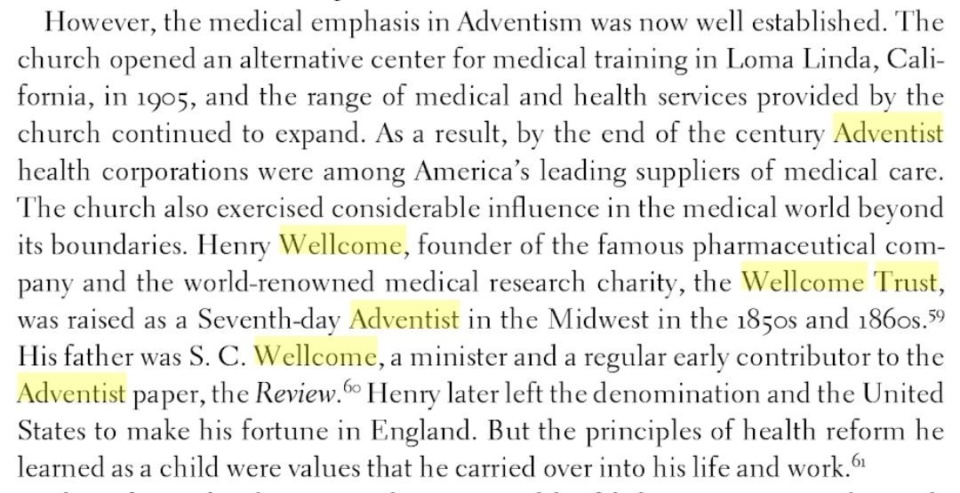
Henry grew up in an Adventist household as his father was an Elder of the Church and he remained committed to many of the Seventh-day Adventist Health Reform principles he grew up with throughout his life.
The Trust Funds came from the Wellcome Foundation which had consolidated all Henry's commercial and non-commercial activities in one holding company back in 1924. Note:- the Wellcome Trust currently has over $29.3 billion in assets! How many drugs have been sold to band-aid sick-care and create that kind of wealth?
"We aim to stimulate research excellence and develop global collaborations to drive change," the London-based philanthropy explains on a web page that highlights its commitment to making "cities healthy and environmentally sustainable."
"The trust does not highlight, however, that some of the more than $1.2 billion it has handed out annually in recent years comes from investments in companies that contribute to the same problems the philanthropy wants to solve. Not long before the Hong Kong study was published, for example, the trust became an investor in Varo Energy, a company based in Cham, Switzerland, that sells fuel to shipping firms. One of Varo's main products is bunker fuel for marine engines: a cheap, sulfurous residue of oil refining that is a major source of soot pollution. Particulates billowing from ship stacks contribute to the premature deaths of 250,000 people annually, researchers estimate."
#Yes2Meat
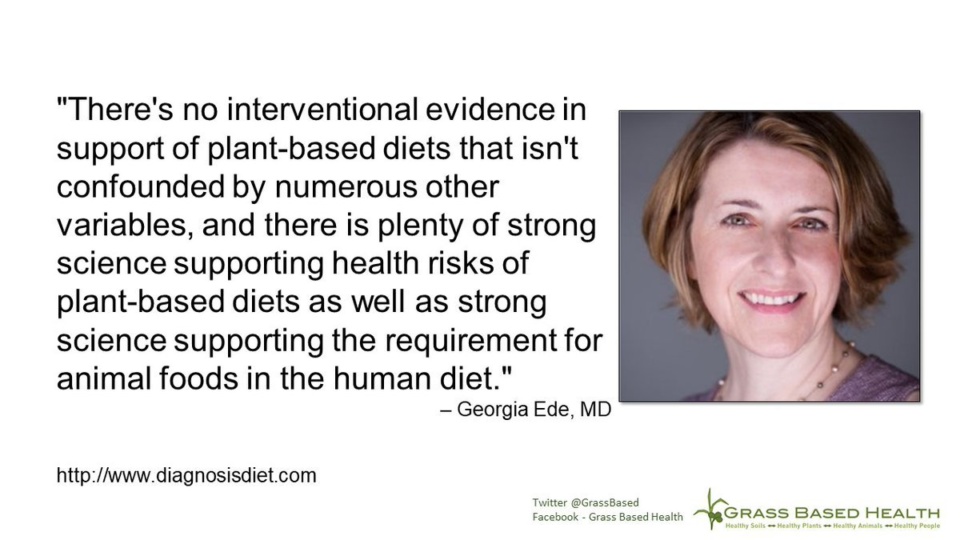
The Sustainable Dish
Diana Rodgers is a dietitian and is the author of the website The Sustainable Dish. Her post on the EAT-Lancet Commission's report is well worth reading! She reiterates the science in point form in her post 20 Ways EAT Lancet’s Global Diet is Wrongfully Vilifying Meat and I share a taster here:-
1. There’s No Proof That Meat Will Kill You
The EAT Lancet report greatly exaggerates the studies linking meat eating to poor health. The studies vilifying the health effects of meat are based on observational epidemiology, which can’t show actual cause, only associations.
5. Reducing Animal Consumption Will Increase Nutrient Deficiencies
Red meat is important to the global human diet and “its contribution of protein and key micronutrients is under-appreciated.” A recent study looked at what might happen if the entire US eliminated animal products from our diet. Overall calories would go up (we’re already having an issue with over-consumption of calories) and nutrient deficiencies would also increase. And what about all of our greenhouse gas (GHG) emissions? Overall emissions would be reduced by a mere 2.6%. It turns out, eliminating animals would “create a food supply incapable of supporting the US population’s nutritional requirements.”
The EAT-Lancet #PlanetaryHealthDiet ignores the role of animals in a sustainable food system.
"I deplore factory farming and think CAFOs, battery, certain live transport and gestation crates are despicable; you get no argument from me on those. It is clear that all agriculture needs to change. However, we need to stop playing into the hands of industrial agricultural corporations by saying ‘we need to feed the world’ and rather support our local farmers by asking, ‘how do we feed our community?’ and then take it from there." Tim Rees
Dr Vandana Shiva writes a powerful commentary "The report (EAT-Lancet) is a failed attempt at “sustaining” the chemical industry through unscientific promotion of “Sustainable intensification” and Precision Agriculture. “The current global food system requires a new agricultural revolution that is based on “sustainable intensification” and driven by sustainability and system innovation. This would entail at least a 75% reduction of yield gaps on current cropland, radical improvements in fertilizer use”. https://seedfreedom.info/wp-content/uploads/2018/11/The-Future-of-Our-Daily-Bread-_-LowRes-_-19-11-2018-REVISED.pdf
"The report wants a shift to healthy diets without a shift in the chemical agriculture paradigm which is at the root of the destruction of the planet’s soil, water, biodiversity and climate, as well as the spread of chronic diseases.
It continues to focus on “yield” – a measure evolved for industrial agriculture based on chemicals to produce nutritionally empty toxic commodities. The report seems to be deliberately trying to divert attention from chemical free agriculture and agroecology which have now been recognised as the paradigm for the future.
"Nearly a sixth of the world’s population depends on livestock for livelihoods. Pastoralists are sustained by and sustain drylands. Animals are at the heart of sustainable food systems. Integration of crops, trees, animals is what allows recycling of nutrients, and freedom from chemicals. The central role of animals in diverse agro-ecological systems for both soil fertility renewal and in renewable energy must be emphasized in any search for sustainable food systems that free us from fossil fuels and toxics. Let us not forget that life would be impossible for desert tribes without the camel, or without the yak in the high Himalaya and the Tibetan Plateau.
"Food is the web of life. Food is us. Food is our culture."
I don't know about you, but I don't want to be dictated to about a restrictive diet created by Vested Interests and Ideology around the Garden of Eden diet, that will compromise my health and that of my family. Gary's PET Scan lights up like a Christmas Tree with the glucose uptake by his tumour. His cancer feeds on sugar and carbs. Gary's patients, presenting with complications of Type 2 diabetes, are intolerant of carbohydrates and they need healthy animal proteins and fats to heal.
#benoisywithme and continue to challenge guidelines that make no sense and have the potential to cause harm. It is about health. Our health and that of our planet. The EAT-Lancet Commission is wrong...
I will leave you with some more of the conversation on Twitter. Join in if you can.
